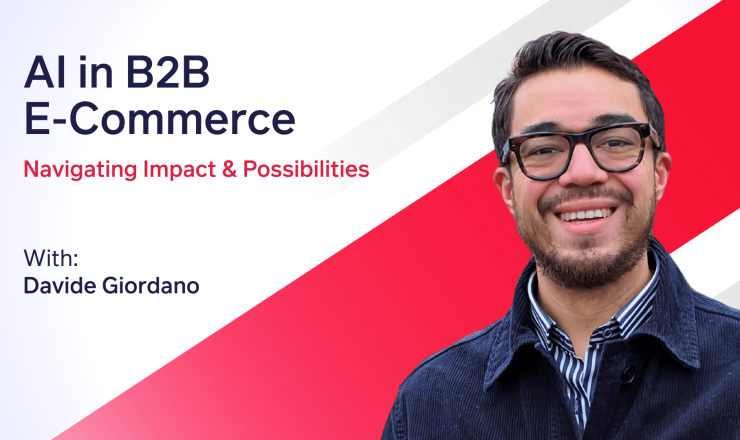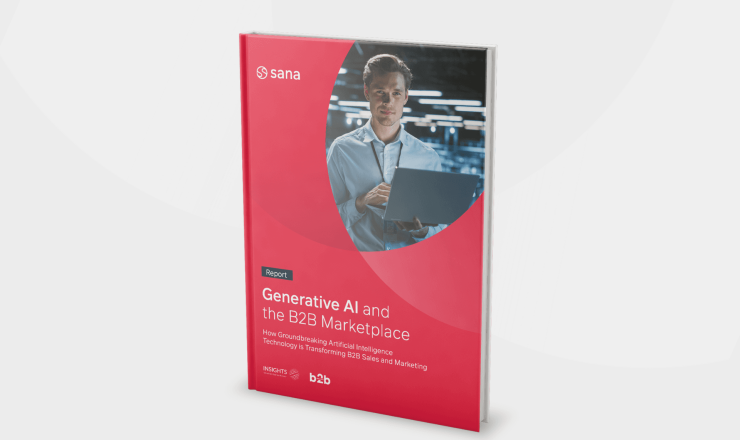

If you’re in B2B commerce, you’re already used to finding solutions to customers’ problems and ironing out pain points. Often to the point where it’s hard to find the time to address your own brand challenges. Alongside crafting impactful campaigns for diverse audiences, creating an effective marketing strategy, and managing a tight budget, there’s a mountain of data to get to grips with.
So, if you’re struggling to organize your CRM, e-commerce platforms and so forth, don’t despair. AI can help B2B businesses like yours to connect with customers, predict trends, and streamline operations. This is data-led, real-time intelligence that empowers you as a marketer, rather than replacing you as a human. Let’s explore some of the top ways to use AI in your B2B business.
How can AI work for your B2B business?
AI Basics for B2B Leaders
What even is AI?
AI, or Artificial Intelligence, creates systems that can think and learn like humans. In the B2B marketing world, AI is used to crunch data, qualify leads, personalize customer interactions, and automate campaigns, making everything more targeted and efficient.
Why should B2B marketers care?
AI and machine learning (ML) provide personalized customer insights, predictive analytics, and automated marketing strategies that can transform B2B sales and marketing. ML algorithms analyze vast amounts of data, uncover patterns and trends, and optimize lead scoring and qualification. All this helps you create targeted marketing campaigns that resonate with the right people at the right time. Like the best marketers, AI learns from its mistakes and successes, improving results every time.
So, if you want to boost engagement, drive higher conversion rates, and maximize your marketing efforts you should care about AI.
Isn’t AI expensive/complicated?
Not necessarily. AI marketing tools and platforms are designed to be user-friendly and implemented and managed without specialist knowledge. Enterprise-level options are available for businesses that want more advanced, customized solutions.
Actionable ways to use AI in B2B, today
With AI for B2B theory 101 done and dusted, let’s explore the fun part. Here are some actionable ways to use AI to enhance your marketing activities and boost ROI.
- Smart lead generation: AI-powered tools create order out of what can become chaos in your lead gen strategy. They sift through prospects efficiently, helping you score and segment leads, accurately. They can even anticipate customer behavior through predictive modeling.
- Customer segmentation that makes sense: AI goes beyond demographics, grouping customers by their specific needs in real time. The result: Ultra-targeted marketing that makes individual visitors feel seen and heard, increases loyalty, and gives you a competitive edge.
- Personalized marketing that doesn’t feel creepy: AI tailors product descriptions, recommendations and campaigns based on individual shoppers’ behavior and purchase history. For example, you could send a targeted offer right when a customer is ready to make a repeat purchase, or alert regular buyers when products are running low or are back in stock.
Want to save time crafting product descriptions? Take a look at this handy OpenAI product description add-on which generates text based on product data from your ERP and/or PIM system.
- Predictive analytics for sales success: AI helps you forecast demand, identify upsell and resell opportunities, and optimize conversions. It can also inform a dynamic pricing strategy based on predicted market conditions. Predictive analytics, trained on real-time and historical data, ensure you always have enough stock by forecasting demand. This enables you to optimize inventory levels and manage the supply chain effectively, anticipating customer needs and ensuring you can meet them.
- Chatbots that actually help: Gone are the days of awkward, robotic chatbots. AI-powered customer support bots now engage in natural, insightful, and personalized conversations that engage and assist swiftly. They can also automate inbound requests and provide answers before customers even ask. Offering quick, accurate query resolution and 24/7 support is invaluable for customer service and boosting that all-important loyalty. It also frees up your team to focus on more complex, strategic tasks.
- Data analysis that drives decisions: AI uncovers insights from your data that would take humans ages to find. The ability to make better business decisions saves money, improves strategy, and enhances customer service. This is particularly beneficial in a time-critical, highly-competitive market like e-commerce where one small mistake could mean losing your customer and damaging your brand reputation.

Take 30 minutes to walk through AI’s potential in B2B.
Watch our on-demand session from the Sana Customer Summit.
B2B case studies: AI in action
As with many aspects of marketing, the best way to learn about AI is to see it in action. Here are a couple of real-world examples of B2B companies using AI successfully.
JP Morgan Chase boosts CTR by 450%
With a wealth of data to manage and strict regulations to adhere to, the banking sector can benefit significantly from the smart use of AI. A great example is JP Morgan Chase, who used AI to enhance ad performance, increasing click-through rates by 450%. This achievement was made possible by adopting AI software that optimized their copy and headlines, leading to this notable increase in engagement.
FedEx and Sprint improve predictions by up to 90%
FedEx and Sprint leverage predictive analytics to improve customer retention. They can accurately identify customers who are likely to switch to competitors, achieving a prediction accuracy between 60% and 90%. Moreover, they can foresee which customers are 10 times more likely to cancel their deliveries.
The future of AI in B2B (and how to get started)
Now you’re feeling inspired, let’s explore what the future might hold for AI and ML and the best ways to get started.
Generative AI for sales and marketing
Most marketers have already experimented with ChatGPT and other generative AI tools. The tech still has its limitations but it is very useful for creating first drafts of content (with human intervention added to ensure it is 100% on-brand, accurate and that it resonates well). Generative AI is also helpful for crafting personalized copy and pitches, pinpointing underperforming webpages and providing inspiration for campaigns and targeted messaging.
How AI is changing B2B buying
Today’s customers expect personalized experiences, and AI can help marketers meet this demand. A 2023 global survey found that 70% of business leaders are increasing their investment in personalization. However, over half of the respondents indicated that acquiring accurate data remains a problem. Even with access to precise data, effective implementation is still a challenge. Only 60% of retailers worldwide reported having the capability to use customer data for personalization, highlighting that the difficulty lies not only in accessing the data but also in executing it effectively.
Adopting and optimizing AI can be a steep learning curve, but by following the guidance in this article and keeping up to date on new approaches and tools, your efforts will be rewarded.
Getting started with AI
- Start small: Identify a specific pain point (e.g., lead scoring) and find a tool to address it. Then iterate and build from there. Harness data from your e-commerce platform, CRM and other tools, and integrate it well. Then look at search patterns and behavior trends and identify obstacles to overcome and opportunities to capitalize on.
- Don’t go it alone: While many AI tools are easy to use and access, you might still benefit from working with AI consultants or partners. If you could do with a hand getting started or optimizing your strategy, get in touch. We’d love to help.
- Measure and iterate: Always take time to track the impact of AI tools and adjust your strategy as needed. A/B test where appropriate and use e-commerce software that enable you to benchmark performance against competitors and your historical data.
Starting your journey to better B2B with AI
We hope this article has demonstrated the considerable benefits of using AI in B2B. Like all elements of your sales and marketing strategy your success depends on ensuring your efforts are aligned with your goals, choosing the right tools, carefully considering your customer needs, and continuously monitoring your performance and acting on results.
It’s important to remember that AI is a tool to empower B2B businesses, not a threat. Take the time to do your research. Find tools that you can use and manage easily and that help you meet your specific objectives – and don’t try to run before you can walk. By taking this approach and keeping the guidance in this article in mind, you and your customers will soon be enjoying the many benefits that AI offers for B2B marketers.

81% of businesses are already using AI.
Learn what they’re doing with it in our brand new report.



